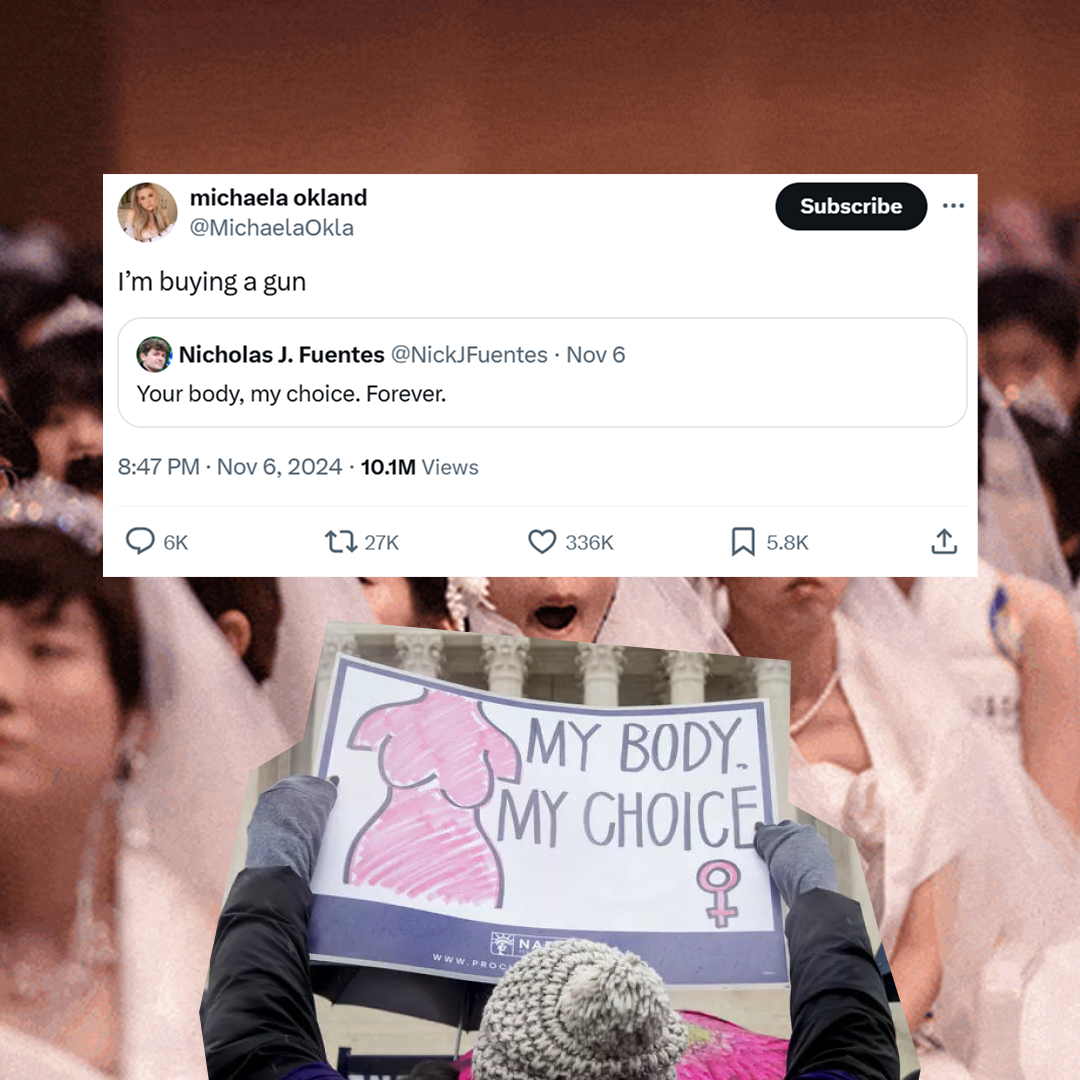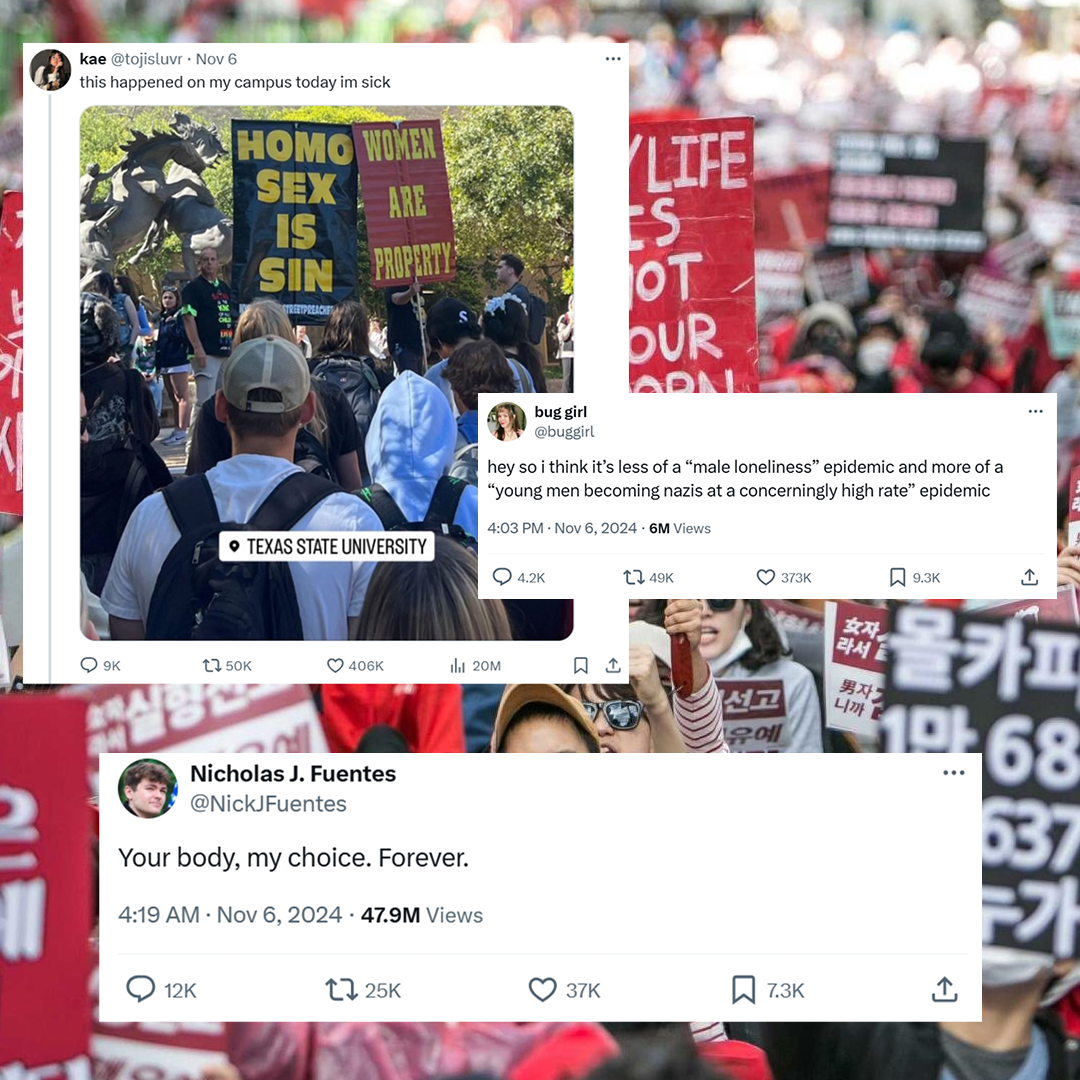Trump 2024, Woman Hatred and the Misguided Appropriation of the 4B Movement
Words: Lilac Carr
Make it stand out
Following the results of the US election, white supremacist and former dinner party guest of Donald Trump, Nick Fuentes, posted on the site formerly known as Twitter: ‘Your body, my choice. Forever.’ and received 45 million views. Fuentes was not alone in his sentiment - a pro-Trump radical Christian protest at Texas State University saw men carrying signs such as ‘Women Are Property’. The incoming Vice President, JD Vance, openly supports a national abortion ban.
The Republican party, far-right misogynist influencers and the growing incel community have emboldened men to behave in violent and dangerous ways toward women and gender-non-conforming people. Young white men in particular - who overwhelmingly voted for Trump - are creating an environment which ensures women cannot feel safe or secure in their homes or have autonomy over their own bodies.
In retaliation, many posts from terrified American women are calling for other women to ‘stop having sex with men’, and start picking up guns to defend themselves. The former is a request for their peers to engage in the 4B Movement as a “protest against the patriarchy”. The movement originates from the more radical end of the South Korean 2010s feminist movement, referring to the Korean ‘bi’ prefix meaning no: in this case, no sex with men (bisekseu), no dating men (biyeonae), no marriage with men (bihon) and no having children (bichulsan).
First, some disclaimers are necessary here: Many, though not all, of these posts appear to have been made without any real engagement with actual South Korean feminism. They consistently overstate the popularity of the in-fact fringe 4B movement amongst South Korean women and over-emphasise the impact of it on South Korean birth rates. One popular post, for example, misleadingly reads “Ladies, we need to start considering the 4B movement like the women in South Korea and give America a severely sharp birth rate decline.”
Another issue that has arisen is how the 4B Movement in South Korea bears striking similarities to the ‘Political Lesbianism’ of second-wave radical feminism that instructed women to reject heterosexuality and consider lesbianism as a political stance as well as a sexuality. In both cases, many of the adoptees of these labels - 4B Movement and Political Lesbianism - have excluded trans women, spouting biological essentialist lines. This is not to suggest that all or even most supporters of the 4B Movement in the US or South Korea are guilty of this, but we should be wary of drawing any essentialist categories that exclude trans people from our understandings of gender-based oppression and paint ‘biological males’ as an intrinsic forever enemy of women.
All that aside, it is clear to see why disavowal of men is appealing to some American women right now. Violence against women is scarily widespread and normalised. In the face of blatant hatred against women and a desire to control women’s bodies shared from young men on campuses to presidential offices, it is more than understandable that some women would decide that abandoning relationships with men would be necessary for the sake of their emotional and physical security.
In some respects, the adoption by some American women of the ideals of the 4B Movement is not about men as much as it is about themselves and a need for their own safety and security. As one Twitter user writes, ‘Reminder that the 4B movement, and the separatist movement in general, isn’t just about avoiding men - it’s also about supporting and investing in women’. Through this lens, the 4B movement is arguably, a rational reflection of American women’s urgent need for security, community, care and support between one another in the face of a country - and, it has to be said, a significant proportion of men - that have not only refused to provide this for them but which has positioned itself against their security and safety.
“Women should be able to have healthy friendships, relationships and sex with men without being made to feel guilty about betraying women or feminism, including by being cruelly told they are rewarding men for their misogyny by doing so.”
Much of the discourse around young white male misogyny in recent years has pointed toward male loneliness, the pressure of toxic masculinity, and the need for mental health support for young men to combat the rise of incels and wider misogyny. These notions come from a place of empathy which is deeply necessary if we want to tackle rising misogyny, yet this comes as a particularly difficult pill to swallow in the midst of brutal attacks on women’s autonomy and bodies by said men.
One X user contests: ‘hey so i think it’s less of a “male loneliness” epidemic and more of a “young men becoming nazis at a concerningly high rate” epidemic’ and while this misses the fact that the two things are more often than not two sides of the same coin, it is a lot to expect of American women right now to consider the core issues creating misogynistic men as their rights, safety and lives are being taken away by them.
Ultimately though, while the appeal of the 4B Movement and a rejection of men wholesale is understandable in the midst of a violently anti-women climate, such a proposition is a bleak forecast for women’s futures. Women should not feel they have to abandon men to be safe. Women should not have to abandon sex with men to be safe - and, it should be noted, this directive does nothing for victims of sexual assault, whose choice to say no is violently denied.
Women should be able to have healthy friendships, relationships and sex with men without being made to feel guilty about betraying women or feminism, including by being cruelly told they are rewarding men for their misogyny by doing so. Women should be able to choose whether to have children or not, without coercion by a patriarchal society, either by forcing them to have children or by scaring them into not having them. I hope, then, that if the 4B Movement is an understandable short-term protective response against the brutal misogyny made clearer than ever in America once again, that it does not have to be the long-term one.


